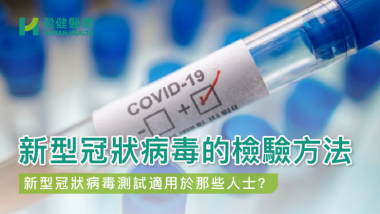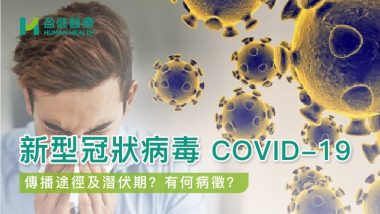Education Corner

*Availalbe in Chi Version Only
 Testing for COVID-19
Testing for COVID-19 *Availalbe in Chi Version Only
2020.3.27 Novel Coronavirus Infection
Novel Coronavirus Infection Causative agent “Severe Respiratory Disease associated with a Novel Infectious Agent” refers to the cluster of viral pneumonia cases occurring in Wuhan, Hubei Province. According to investigation by the Mainland health authorities, a novel coronavirus is found to be the causative agent. Clinical features According to information provided by the Mainland health authorities, symptoms of the cases include fever, malaise, dry cough and shortness of breath. Some cases were in serious condition. People of older age or having underlying disease are at a higher risk of deterioration into serious condition. Mode of transmission and incubation period The main mode of transmission of novel coronavirus is through respiratory droplets, the virus can also be transmitted through contact. Current information suggests that the incubation period ranges from 1 to 12.5 days (with median estimates of 5 to 6 days), but can be as long as 14 days. Management The main treatment is supportive. Prevention There is no vaccine for this infectious disease at the moment.Health advice To prevent pneumonia and respiratory tract infection, members of the public should always maintain good personal and environmental hygiene. They are advised to: Wear a surgical mask when taking public transport or staying in crowded places. It is important to wear a mask properly, including hand hygiene before wearing and after removing a mask; Perform hand hygiene frequently, especially before touching one's mouth, nose or eyes; before eating; after using the toilet; after touching public installations such as handrails or door knobs; or when hands are contaminated by respiratory secretions after coughing or sneezing; Maintain drainage pipes properly and regularly (about once a week) pour about half a litre of water into each drain outlet (U-traps) to ensure environmental hygiene; After using the toilet, put the toilet lid down before flushing to avoid spreading germs; Wash hands with liquid soap and water, and rub for at least 20 seconds. Then rinse with water and dry with a disposable paper towel. If hand washing facilities are not available, or when hands are not visibly soiled, performing hand hygiene with 70 to 80 % alcohol-based handrub is an effective alternative; Cover your mouth and nose with tissue paper when sneezing or coughing. Dispose of soiled tissues into a lidded rubbish bin, then wash hands thoroughly; and When having respiratory symptoms, wear a surgical mask, refrain from work or attending class at school, avoid going to crowded places and seek medical advice promptly. Travel advice The public should take heed of the health advice below when travelling outside Hong Kong: Do not travel to Hubei Province where community transmission of novel coronavirus is occurring; Avoid close contact with persons with fever or respiratory symptoms in countries/areas with possible community transmission of novel coronavirus infection. If it is unavoidable to come into contact with them, put on a surgical mask and continue to do so until 14 days after returning to Hong Kong; Avoid visiting hospitals. If it is necessary to visit a hospital, put on a surgical mask and observe strict personal and hand hygiene; Avoid touching animals (including game), poultry/birds or their droppings; Avoid visiting wet markets, live poultry markets or farms; Avoid making close contact with patients, especially those with symptoms of acute respiratory infections; Do not consume game meat and do not patronise food premises where game meat is served; Adhere to food safety and hygiene rules such as avoiding consuming raw or undercooked animal products, including milk, eggs and meat, or foods which may be contaminated by animal secretions, excretions (such as urine) or contaminated products, unless they have been properly cooked, washed or peeled; If feeling unwell when outside Hong Kong, especially if experiencing a fever or cough, wear a surgical mask, inform the hotel staff or tour escort and seek medical advice at once; and After returning to Hong Kong, consult a doctor promptly if experiencing a fever or other symptoms, take the initiative to inform the doctor of any recent travel history and any exposure to animals, and wear a surgical mask to help prevent spread of the disease. * Source: Centre for Health Protection
2020.2.11